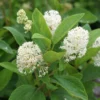NEED SUPPORT WITH YOUR ORDER? Get in touch
Not satisfied with your purchase?
Enter your Order ID on website, and we'll resolve it right away.
Original price was: $84.99.$64.99Current price is: $64.99.
Bring ecological beauty to your garden with the New Jersey Tea Plant (Ceanothus Americanus). This native pollinator shrub offers fragrant white flowers, attracting butterflies and bees. It’s a low-maintenance, cold hardy New Jersey Tea variety, thriving in full to part sun and adaptable to various soil types. Perfect for supporting local biodiversity.
Mar 05
Mar 10 - Mar 12
Mar 15 - Mar 19
USDA Hardiness Zone
Soil Type
Sunlight Exposure
Expected Planting Period
Shipping and return policies: Our Alive & Thrive Guarantee covers issues with your plants within the first 30 days. Get in touch with us via email, and our team will review your concerns and, if necessary, provide you with a one-time replacement at no cost.
If you're unsure about your hardiness zone, feel free to reach out to us. Our team will answer your questions and help you find the plants that are truly suitable for your environment, climate, and personal preferences.
Introduce a touch of native charm and vital ecological support to your outdoor space with the New Jersey Tea Plant (Ceanothus Americanus). This resilient and beautiful live shrub is celebrated for its abundant, fragrant white flowers that create a stunning display from spring through summer, drawing in a diverse array of beneficial pollinators. Often referred to simply as the New Jersey Tea Plant, this native gem is an exceptional choice for gardeners aiming to enhance visual appeal while fostering local biodiversity. Its ease of care and rewarding presence make it a perfect addition to any home landscape, offering both aesthetic pleasure and environmental benefits.
The Ceanothus Americanus live plant is not just a pretty face; it’s a powerhouse for local ecosystems. Serving as an essential host plant for various butterfly species, including the Spring Azure, Mottled Duskywing, and Summer Azure, cultivating this shrub directly contributes to the life cycles of these magnificent insects. Its inherent resilience and remarkable adaptability ensure it’s a low-maintenance option suitable for gardeners of all experience levels, making it an ideal choice for anyone seeking to make a positive environmental impact with an easy grow native plant. Embrace the beauty and ecological significance of this remarkable shrub today.
The New Jersey Tea Plant offers a multitude of benefits, making it an invaluable addition to any garden. Its natural beauty is matched only by its ecological contributions, providing a rewarding experience for any gardener. Enjoy these advantages by incorporating the Ceanothus Americanus live plant into your landscape:
Caring for your New Jersey Tea Plant is straightforward, thanks to its robust and adaptable nature. To ensure your Ceanothus Americanus live plant thrives, understanding its basic needs is key. This native pollinator shrub prefers a location with full sun to partial shade, meaning it should receive at least 4-6 hours of direct sunlight daily for optimal flowering and growth. While it’s adaptable to various soil types, well-draining soil is crucial to prevent root rot. If your soil is heavy clay, consider amending it with organic matter to improve drainage.
Watering should be consistent during the plant’s establishment period, typically the first year after planting. Once established, the New Jersey Tea Plant is quite drought-tolerant and will only require supplemental watering during prolonged dry spells. Avoid overwatering, as this can be detrimental to its health. Fertilization is generally not necessary for this easy grow native plant, especially if planted in good quality soil. If you notice slow growth or pale foliage, a light application of a balanced, slow-release fertilizer in early spring can be beneficial. Pruning can be done in late winter or early spring to maintain shape and encourage new growth. Remove any dead or damaged branches and thin out crowded areas to improve air circulation. With its robust nature, the cold hardy New Jersey Tea is generally resistant to most pests and diseases, making it a truly low-maintenance choice for your garden.
This offering is for a New Jersey Tea Plant, a vigorous Ceanothus Americanus live plant, supplied in a convenient gallon pot size, ensuring it arrives with a well-established root system ready for planting. These plants typically reach a mature height of 2-4 feet with a similar spread, forming a compact and rounded shrub that fits beautifully into various garden designs. Its moderate growth rate means you’ll see noticeable development within the first few seasons, leading to abundant blooms. Expect the fragrant white flowers to emerge from spring through summer, creating a stunning visual and aromatic display. This native pollinator shrub is a long-lived perennial, providing years of beauty and ecological benefit. Its robust nature and cold hardy New Jersey Tea characteristics make it an excellent investment for sustainable landscaping.
You must be logged in to post a review.

Reviews
There are no reviews yet.